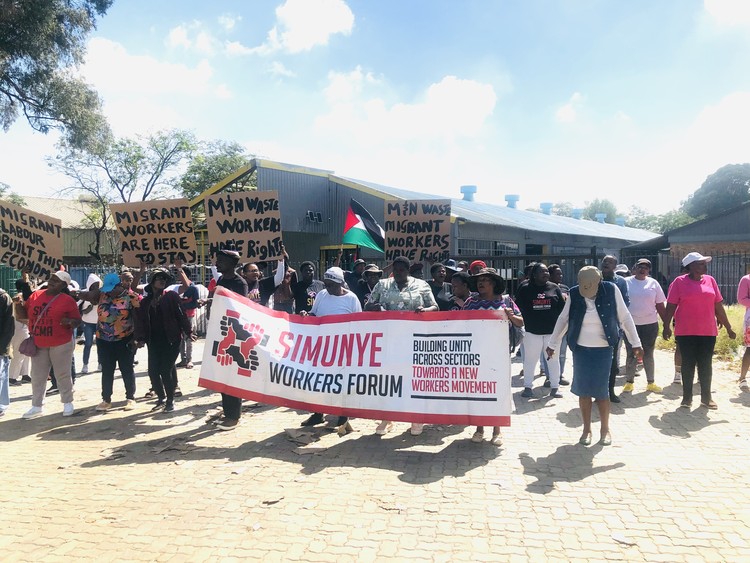Setback for casual workers as court rules forum is not a union
But Simunye Workers Forum can still amend its constitution and reapply for registration
The Labour Court of Appeal has ruled that the Simunye Workers Forum fails to comply with the Labour Relations Act for registration as a union. Archive photo: Kimberly Mutandiro
- The Simunye Workers Forum (SWF) has lost its bid to register as an official trade union, preventing its 6,600 mainly casual worker members from access to formal representation in disputes.
- The Labour Court of Appeal ruled that the forum’s non-hierarchical approach with no permanent office bearers fails to comply with the union registration requirements of the Labour Relations Act.
- The court said SWF can amend its constitution and reapply for registration.
In a blow to the Simunye Workers Forum (SWF), the Labour Court of Appeal has ruled that the forum does not qualify to be registered as an official trade union.
The Registrar of Labour Relations appealed against an earlier ruling by the Johannesburg Labour Court, which directed the Registrar to immediately registrar the SWF as a union. This would have meant that the forum, which has about 6,600 members, mainly casual, vulnerable workers, would be able to represent them formally in disputes, wage negotiations, and in matters before the Commission for Conciliation, Mediation and Arbitration (CCMA).
But Appeal Court Acting Judge President Kate Savage (with two judges concurring) has said the ruling was wrong.
The SWF was formed with the assistance of the Casual Workers’ Advice Office (CWAO), a non-profit organisation that assists casual workers with labour disputes.
At the end of 2020, it decided to apply for registration in terms of the Labour Relations Act (LRA).
To that end, it adopted a constitution, opened a bank account, and held an annual general meeting. In June 2022, its application to the Registrar was refused.
SWF said it was a “modern trade union”, not constituted in the same manner as traditional trade unions which it did not “trust”.
It had no “hierarchical structure” or permanent office bearers
It approached the labour court after the Registrar refused to register it as a union.
In the lower court, Judge Andre Van Niekerk said SWF aimed to keep decision-making power in the hands of those members affected by the decision and to ensure that all work done by members was without remuneration, so as to remove any potential for personal financial interest.
Membership fees were fixed at R12.50 a month or R150 annually.
Ordinary meetings were convened when necessary. Each meeting elected a chairperson and a secretary for the next meeting. Decisions were taken by a majority vote.
Judge van Niekerk said while the structure was unique, the Registrar had refused to register SWF, saying its constitution did not meet the requirements of the LRA. The Fegistrar did not consider it to be a “genuine trade union” independent of the CWAO.
He said since the LRA had been brought into operation in 1995, the labour market had changed and “new forms of worker organisations will inevitably emerge to meet these challenges and better serve the interests of the more vulnerable”.
There was no legal impediment to its registration, he ruled.
Appeal court ruling
But Judge Savage said the LRA dictated that unions had to establish permanent offices with defined functions and clear procedures for elections and removals.
The SWF did not comply with these requirements.
She said the Act created a framework for registration to ensure accountability, transparency and democracy.
“This serves to protect members, the organisation itself and the external parties with whom it relates,” she said.
“While the express intent of the SWF constitution is to keep decision-making powers in the hands of those members affected by the decision in question with all work done by members and no person remunerated for any work done, it fails to comply with the requirements for registration,” Judge Savage said.
She said SWF should be permitted to revisit and amend its constitution and it could apply again for registration.
She upheld the appeal but made no order as to costs, saying “the SWF and its members are the most vulnerable of workers, whereas the Registrar performs a regulatory function, resourced by the State”.
A spokesperson for SWF said it had met its lawyers over the weekend and resolved to launch a constitutional challenge.
Support independent journalism
Donate using Payfast

Don't miss out on the latest news
We respect your privacy, and promise we won't spam you.
© 2025 GroundUp. This article is licensed under a Creative Commons Attribution-NoDerivatives 4.0 International License.
You may republish this article, so long as you credit the authors and GroundUp, and do not change the text. Please include a link back to the original article.
We put an invisible pixel in the article so that we can count traffic to republishers. All analytics tools are solely on our servers. We do not give our logs to any third party. Logs are deleted after two weeks. We do not use any IP address identifying information except to count regional traffic. We are solely interested in counting hits, not tracking users. If you republish, please do not delete the invisible pixel.

